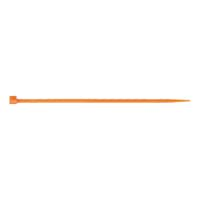Fixanchor W-FAZ/HCR
Fixanchor W-FAZ steel HCR
ANC-(W-FAZ/HCR)-HCR-30-50-M10X110
Art.-no. 5928610030
EAN 4056808276266





Register now and access more than 125,000 products
High loads, low axial and edge clearances
Immediate load-bearing capacity
No waiting times
Time-saving push-through installation
Torque-controlled expanding anchor made of highly corrosion-resistant steel HCR
Fixing anchor cone with patented plastic coating
Safe expansion in cracked concrete
Reduced anchoring depth
- Minimises drilling, time-saving
- Flexible range of applications
- Approval ETA-99/0011 for individual attachment, option 1, cracked and non-cracked concrete, seismic performance category C1 and C2 (M8–M20)
- Fire resistance (M8–M16): F30, F60, F90 and F120; exposure to fire according to DIN 4102-2:1977-09 (uniform temperature-time curve)
- Fire resistance: R30, R60, R90 and R120; TR020 (included in ETA-99/0011)
- Fire load to ZTV-ING Part 5 (uniform temperature curve – tunnel fire room curve)
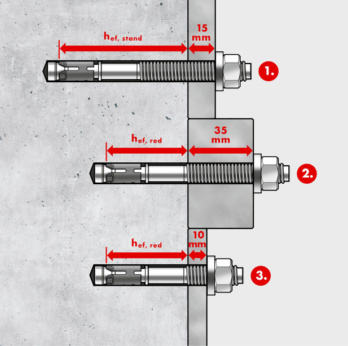
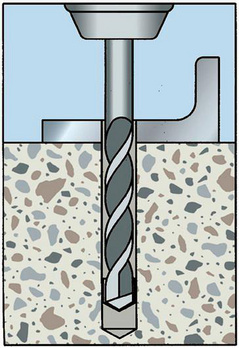
Create the drill hole
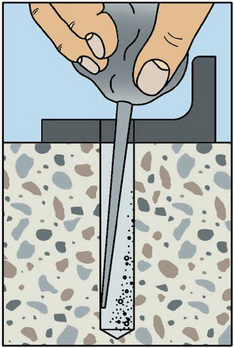
10
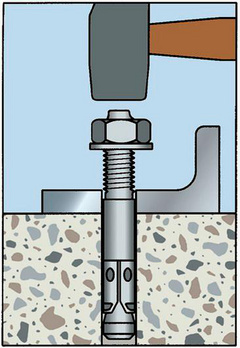
Knock in anchor with mason's mallet or machine setting tool

Set anchor in place

Apply torque
- Approval ETA-99/0011 for individual attachment, option 1, cracked and non-cracked concrete, seismic performance category C1 and C2 (M8–M20)
- Fire resistance (M8–M16): F30, F60, F90 and F120; exposure to fire according to DIN 4102-2:1977-09 (uniform temperature-time curve)
- Fire resistance: R30, R60, R90 and R120; TR020 (included in ETA-99/0011)
- Fire load to ZTV-ING Part 5 (uniform temperature curve – tunnel fire room curve)
Datasheets(X)
CAD data (available after login)
Individual attachment with approval
Standard concrete C20/25 to C50/60 (cracked and non-cracked concrete, seismic performance category C1 and C2)
For the attachment, e.g. of metal structures, metal profiles, brackets, footplates, supports, cable conduits, pipes, railings, wooden structures, roof beams etc.
Individual attachment without approval
Can be used in concrete < C20/25 and compression-proof natural stone
W-FAZ/HCR (highly corrosion-resistant steel) can be used in areas where there is a very high risk of corrosion (e.g. indoor swimming pools, road tunnels, poorly ventilated car parks or parts in seawater and coastal atmospheres).
Metric anchor diameter | M10 |
Anchor length (l) | 110 mm |
Attachment height (t fix) | 30 mm |
Max. attachment height reduced (t fix, red) | 50 mm |
Effective anchoring depth (h ef) | 60 mm |
Effective anchoring depth reduced (h ef, red) | 40 mm |
Width across flats | 17 mm |
Nominal drill-bit diameter (d 0) | 10 mm |
Drill hole depth (h 1) | 75 mm |
Drill hole depth reduced (h 1, red) | 55 mm |
Material | High corrosion-resistant steel, 1.4529, X1NiCrMoCuN25-20-7 |
Torque during anchoring (T inst) | 35 Nm |
Through-hole in the component to be connected (d f) | 12 mm |
Approval | ETA-99/0011 |
| Performance data | ||||||||||||
| Anchor diameter [mm] | M8 | M10 | M12 | M16 | M20 | M24 | ||||||
| Standard effective anchorage depth/ Reduced effective anchorage depth | hef/hef,red [mm] | 46 | 353) | 60 | 40 | 70 | 50 | 85 | 65 | 100 | 125 | |
| Admissible centric tension load1) on an individual anchor without the influence of the edge distance | Tensile zone (cracked concrete C20/252), s ≥ 3 hef c ≥ 1.5 hef) | Nadm [kN] = C20/252) | 2,4 | 2,4 | 4,3 | 3,6 | 7,6 | 6,1 | 11,9 | 9,0 | 17,1 | 19,0 |
| Compressive zone (uncracked concrete C20/252) (scr,sp and ccr,sp, see approval) | 5,7 | 3,6 | 7,6 | 4,3 | 11,9 | 8,5 | 16,7 | 12,6 | 24,0 | 33,6 | ||
| Admissible shear load1) on an individual anchor without the influence of the edge distance | Tensile zone (cracked concrete C20/252), c ≥ 10 hef) | Vadm [kN] = C20/252) | 7,4 | 7,4 | 11,4 | 10,4 | 17,1 | 14,5 | 31,4 | 21,6 | 43,9 | 67,1 |
| Compressive zone (uncracked concrete C20/252), c ≥ 10 hef) | 7,4 | 7,4 | 11,4 | 11,4 | 17,1 | 17,1 | 31,4 | 30,2 | 43,9 | 70,6 | ||
| Admissible bending moment | Madm [Nm] | 14,9 | 14,9 | 29,7 | 29,7 | 52,6 | _ | 114,3 | _ | 231,6 | 448,8 | |
| For admissible load when exposed to fire (R30, R60, R90, R120), please refer to European Technical Approval ETA-99/0011 | ||||||||||||
| Fire resistance | F30 [kN] | 9,0 | _ | 15,0 | _ | 19,0 | _ | 30,0 | _ | _ | _ | |
| F60 [kN] | 5,0 | _ | 9,0 | _ | 12,0 | _ | 15,0 | _ | _ | _ | ||
| F90 [kN] | 1,8 | _ | 4,0 | _ | 5,0 | _ | 7,5 | _ | _ | _ | ||
| F120 [kN] | 1,0 | _ | 2,0 | _ | 3,0 | _ | 6,0 | _ | _ | _ | ||
| 1) The partial safety factors of the resistances regulated in the approval and a partial safety factor of the actions of γF = 1.4 have been taken into account. For information on combining tensile and shear loads, on the influence of the edge distance, and on anchor groups, please refer to the European Technical Approval Guidelines (ETAG), Annex C. 2) The concrete has normal reinforcement. Higher values are possible for higher concrete compressive strengths. 3) The use is limited to the anchorage of statically indeterminate systems. Only suitable for use in dry indoor areas. | ||||||||||||
| Characteristic values | |||||||||||
| Anchor diameter [mm] | M8 | M10 | M12 | M16 | M20 | M24 | |||||
| Standard effective anchorage depth/ Reduced effective anchorage depth | hef/hef,red [mm] | 46 | 353) | 60 | 40 | 70 | 50 | 85 | 65 | 100 | 125 |
| Embedment depth | hnom [mm] | 52 | 41 | 68 | 48 | 80 | 60 | 97 | 77 | 114 | 140 |
| Axis distance | Scr,N [mm] | 138 | 105 | 180 | 120 | 210 | 150 | 255 | 195 | 300 | 375 |
| Edge distance | Ccr,N [mm] | 69 | 52,5 | 90 | 60 | 105 | 75 | 127,5 | 97,5 | 150 | 187,5 |
| Standard minimum member thickness | hstd ≥ [mm] | 100 | _ | 120 | _ | 140 | _ | 160 | _ | 200 | 250 |
| Minimum axis distance Cracked concrete | smin ≥ [mm] | 40 | _ | 50 | _ | 60 | _ | 60 | _ | 95 | 125 |
| Minimum axis distance Uncracked concrete | smin ≥ [mm] | 40 | _ | 50 | _ | 60 | _ | 65 | _ | 90 | 125 |
| Minimum axis distance Cracked concrete | for c ≥ [mm] | 70 | _ | 75 | _ | 100 | _ | 100 | _ | 150 | 125 |
| Minimum axis distance Uncracked concrete | for c ≥ [mm] | 80 | _ | 75 | _ | 120 | _ | 120 | _ | 180 | 125 |
| Minimum edge distance Cracked concrete | cmin ≥ [mm] | 40 | _ | 55 | _ | 60 | _ | 60 | _ | 95 | 125 |
| Minimum edge distance Uncracked concrete | cmin ≥ [mm] | 50 | _ | 60 | _ | 75 | _ | 80 | _ | 130 | 125 |
| Minimum edge distance Cracked concrete | for s ≥ [mm] | 80 | _ | 90 | _ | 140 | _ | 180 | _ | 200 | 125 |
| Minimum edge distance Uncracked concrete | for s ≥ [mm] | 100 | _ | 120 | _ | 150 | _ | 150 | _ | 240 | 125 |
| Reduced minimum member thickness | hmin [mm] | 80 | 80 | 100 | 80 | 120 | 100 | 140 | 140 | _ | _ |
| Minimum axis distance Cracked concrete | smin ≥ [mm] | 40 | 50 | 45 | 50 | 60 | 50 | 70 | 65 | _ | _ |
| Minimum axis distance Uncracked concrete | smin ≥ [mm] | 40 | 50 | 60 | 50 | 60 | 50 | 80 | 65 | _ | _ |
| Minimum axis distance Cracked concrete | for c ≥ [mm] | 70 | 60 | 90 | 100 | 100 | 160 | 160 | 170 | _ | _ |
| Minimum axis distance Uncracked concrete | for c ≥ [mm] | 80 | 60 | 140 | 100 | 120 | 160 | 180 | 170 | _ | _ |
| Minimum edge distance Cracked concrete | cmin ≥ [mm] | 40 | 40 | 50 | 65 | 60 | 65 | 80 | 100 | _ | _ |
| Minimum edge distance Uncracked concrete | cmin ≥ [mm] | 50 | 40 | 90 | 65 | 75 | 100 | 90 | 170 | _ | _ |
| Minimum edge distance Cracked concrete | for s ≥ [mm] | 80 | 185 | 115 | 180 | 140 | 250 | 180 | 250 | _ | _ |
| Minimum edge distance Uncracked concrete | for s ≥ [mm] | 100 | 185 | 140 | 180 | 150 | 185 | 200 | 65 | _ | _ |
| Nominal drill diameter | d0 [mm] | 8 | 10 | 12 | 16 | 20 | 24 | ||||
| Drill cutting dia. | dcut ≤ [mm] | 8,45 | 10,45 | 12,5 | 16,5 | 20,55 | 24,55 | ||||
| Drill hole depth | h1 ≥ [mm] | 60 | 49 | 75 | 55 | 90 | 70 | 110 | 90 | 125 | 155 |
| Through hole in the component being connected | df ≤ [mm] | 9 | 12 | 14 | 18 | 22 | 26 | ||||
| Torque while installing anchor | Tinst = [Nm] | 20 | 35 | 50 | 110 | 200 | 290 | ||||
| 1) The partial safety factors of the resistances regulated in the approval and a partial safety factor of the actions of γF = 1.4 have been taken into account. For information on combining tensile and shear loads, on the influence of the edge distance, and on anchor groups, please refer to the European Technical Approval Guidelines (ETAG), Annex C. 2) The concrete has normal reinforcement. Higher values are possible for higher concrete compressive strengths. 3) Only suitable for use indoors or in damp rooms. | |||||||||||









